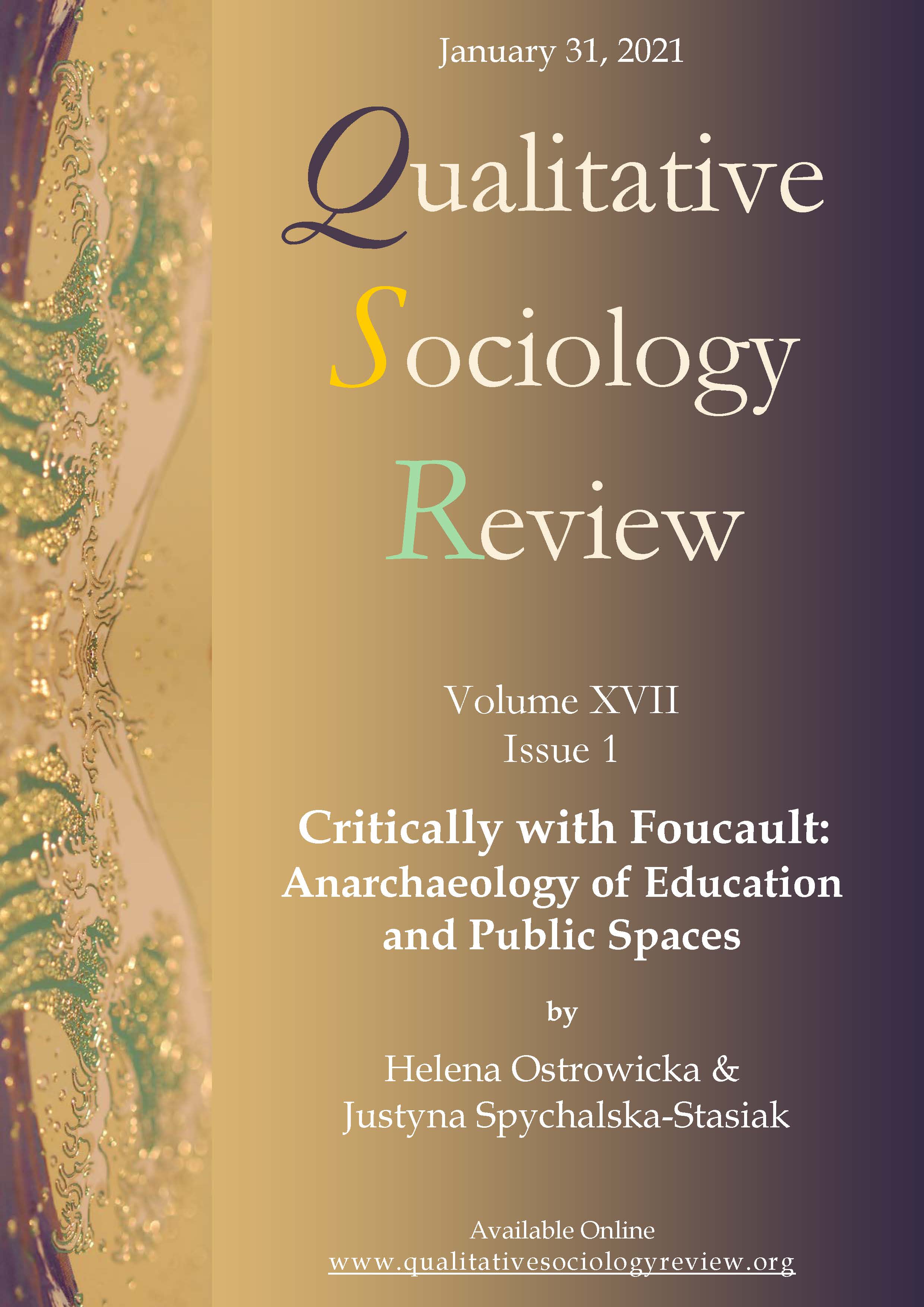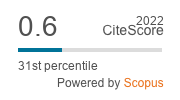Writing Tales of the Future: Five “Balancing Acts” for Globographers
DOI:
https://doi.org/10.18778/1733-8077.17.1.9Keywords:
Ethnographic Imagination, Translocal Fieldwork, Creative Writing, Qualitative Research, Communication StrategyAbstract
Since the early 1990s much has been written about how ethnographers should do fieldwork of the local in a globalizing world. The challenge of communicating their analyses authentically in a world of information overload is much less debated. To rectify this situation, I argue in this paper that five balancing acts are crucial to those who do ethnographies of the global, or “globographers,” in their writing. Emerging from a review of the history of fieldwork and writing, these balancing acts constitute a template of how a communicative consciousness may assist qualitative researchers in achieving ethnographic integrity.
Downloads
References
Abbott, Andrew. 2007. “Against Narrative: A Preface to Lyrical Sociology.” Sociological Theory 25(1):67-99.
Google Scholar
DOI: https://doi.org/10.1111/j.1467-9558.2007.00298.x
Atkinson, Paul. 1990. The Ethnographic Imagination. Textual Constructions of Reality. London: Routledge.
Google Scholar
Atkinson, Paul and Sara Delamont, eds. 2008. Representing Ethnography. Reading, Writing, and Rhetoric in Qualitative Research (Vol. 1-4). London: Sage.
Google Scholar
Baskarada, Saša and Andy Koronios. 2018. “A Philosophical Discussion of Qualitative, Quantitative, and Mixed Methods Research in Social Science.” Qualitative Research Journal 18(1):2-21.
Google Scholar
DOI: https://doi.org/10.1108/QRJ-D-17-00042
Biehl, João and Ramah McKay. 2012. “Ethnography as Political Critique.” Anthropological Quarterly 85(4):1209-1228.
Google Scholar
DOI: https://doi.org/10.1353/anq.2012.0057
Booth, Wayne C., Gregory G. Colomb, and Joseph M. Williams. 2003. The Craft of Research, 2nd ed. Chicago: University of Chicago Press.
Google Scholar
DOI: https://doi.org/10.7208/chicago/9780226065694.001.0001
Brettell, Caroline B. 1986. “Introduction: Travel Literature, Ethnography, and Ethnohistory.” Ethnohistory 3(2):127-138.
Google Scholar
DOI: https://doi.org/10.2307/481769
Brodkey, Linda. 1987. “Writing Ethnographic Narratives.” Written Communication 4(1):25-50.
Google Scholar
DOI: https://doi.org/10.1177/0741088387004001002
Burawoy, Michael, ed. 1991. Ethnography Unbound. Berkeley, CA: University of California Press.
Google Scholar
Burawoy, Michael. 1998. “The Extended Case Method.” Sociological Theory 16(1):4-33.
Google Scholar
DOI: https://doi.org/10.1111/0735-2751.00040
Burawoy, Michael. 2000. “Introduction: Reaching for the Global.” Pp. 1-40 in Global Ethnography. Forces, Connections, and Imaginations in a Postmodern World, edited by M. Burawoy. Berkeley, CA: University of California Press.
Google Scholar
Burawoy, Michael. 2013. “Ethnographic Fallacies: Reflections on Labour Studies in the Era of Market Fundamentalism.” Work, Employment and Society 27(3):526-536.
Google Scholar
DOI: https://doi.org/10.1177/0950017012460316
Burawoy, Michael. 2017. “On Desmond: The Limits of Spontaneous Sociology.” Theory and Society 46(1):261-84.
Google Scholar
DOI: https://doi.org/10.1007/s11186-017-9294-2
Carr, David. 1986. “Narrative and the Real World: An Argument for Continuity.” History and Theory 25(2):117-131.
Google Scholar
DOI: https://doi.org/10.2307/2505301
Charmaz, Kathy and Richard Mitchell Jr. 1996. “The Myth of Silent Authorship: Self, Substance, and Style in Ethnographic Writing.” Symbolic Interaction 19(4):285-302.
Google Scholar
DOI: https://doi.org/10.1525/si.1996.19.4.285
Clair, Robin P. 2003. “The Changing Story of Ethnography.” Pp. 3-29 in Expressions of Ethnography: Novel Approaches to Qualitative Methods, edited by R. P. Clair. New York: SUNY Press.
Google Scholar
Clifford, James. 1983. “On Ethnographic Authority.” Representations 1(2):118-143.
Google Scholar
DOI: https://doi.org/10.1525/rep.1983.2.1.99p0010p
Clifford, James. 1986. “Introduction: Partial Truths.” Pp. 1-27 in Writing Culture: The Poetics and Politics of Ethnography, edited by J. Clifford and G. E. Marcus. Berkeley, CA: University of California Press.
Google Scholar
DOI: https://doi.org/10.1525/9780520946286-003
Clifford, James and George E. Marcus, eds. 1986. Writing Culture: The Poetics and Politics of Ethnography. Berkeley, CA: University of California Press.
Google Scholar
Crapanzano, Vincent. 1977. “Communications: On the Writing of Ethnography.” Dialectical Anthropology 2:69-73.
Google Scholar
DOI: https://doi.org/10.1007/BF00249473
Cury, Maria and Daniel Bird. 2016. “Applying Theory to Applied Ethnography.” Pp. 201-216 in 2016 Ethnographic Praxis in Industry Conference Proceedings. Retrieved December 21, 2020 https://anthro-source.onlinelibrary.wiley.com/doi/pdf/10.1111/1559-8918.2016.01085
Google Scholar
DOI: https://doi.org/10.1111/1559-8918.2016.01085
Czarniawska, Barbara. 2004. Narratives in Social Science Research. Thousand Oaks, CA: Sage.
Google Scholar
DOI: https://doi.org/10.4135/9781849209502
D’Andrea, Anthony, Luigina Ciolfi, and Breda Gray. 2011. “Methodological Challenges and Innovations in Mobilities Research.” Mobilities 6(2):149-160.
Google Scholar
DOI: https://doi.org/10.1080/17450101.2011.552769
Deegan, Mary Jo. 2001. “The Chicago School of Ethnography.” Pp. 11-25 in Handbook of Ethnography, edited by P. Atkinson et al. Thousand Oaks, CA: Sage.
Google Scholar
DOI: https://doi.org/10.4135/9781848608337.n1
Desmond, Matthew. 2014. “Relational Ethnography.” Theory and Society 43(5):547-579.
Google Scholar
DOI: https://doi.org/10.1007/s11186-014-9232-5
Desmond, Matthew. 2016. Evicted. Poverty and Profit in an American City. New York: Allen Lane.
Google Scholar
Edwards, Allan and James Skinner. 2009. Qualitative Research in Sport Management. Oxford: Butterworth-Heinemann.
Google Scholar
Eriksen, Thomas H. 2018. Boomtown: Runaway Globalisation on the Queensland Coast. London: Pluto Press.
Google Scholar
DOI: https://doi.org/10.2307/j.ctv3mt8xn
Ewick, Patricia and Susan Silbey. 1995. “Subversive Stories and Hegemonic Tales: Toward a Sociology of Narrative.” Law and Society Review 29(2):197-210.
Google Scholar
DOI: https://doi.org/10.2307/3054010
Falzon, Mark-Anthony, ed. 2009. Multi-Sited Ethnography. Theory, Praxis, and Locality in Contemporary Research. London: Ashgate.
Google Scholar
Fuchs, Christian. 2017. “From Digital Positivism and Administrative Big Data Analytics towards Critical Digital and Social Media Research!” European Journal of Communication 32(1):37-49.
Google Scholar
DOI: https://doi.org/10.1177/0267323116682804
Geertz, Clifford. 1973. The Interpretation of Cultures: Selected Essays. New York: Basic Books.
Google Scholar
Geertz, Clifford. 1988. Works and Lives. The Anthropologist as Author. Stanford, CA: Stanford University Press.
Google Scholar
Geertz, Clifford. 1995. After the Fact. New York: Basic Books.
Google Scholar
DOI: https://doi.org/10.4159/9780674037526
Geertz, Clifford. 2000. Available Light: Anthropological Reflections on Philosophical Topics. Princeton: Princeton University Press.
Google Scholar
Ghodsee, Kristen. 2016. From Notes to Narrative. Writing Ethnographies That Everyone Can Read. Chicago: University of Chicago Press.
Google Scholar
DOI: https://doi.org/10.7208/chicago/9780226257693.001.0001
Gille, Zsuzsa and Seán Ó’Riain. 2002. “Global Ethnography.” Annual Review of Sociology 28:271-295.
Google Scholar
DOI: https://doi.org/10.1146/annurev.soc.28.110601.140945
Glaeser, Andreas. 2005. “An Ontology for the Ethnographic Analysis of Social Processes.” Social Analysis 49(3):16-45.
Google Scholar
DOI: https://doi.org/10.3167/015597705780275138
Goodale, Mark. 2009. Surrendering to Utopia. An Anthropology of Human Rights. Stanford, CA: Stanford University Press.
Google Scholar
Goodall, H. L. 2010. “From Tales of the Field to Tales of the Future (book review).” Organizational Research Methods 13(2):256-267.
Google Scholar
DOI: https://doi.org/10.1177/1094428109340039
Graham, Mark and William H. Dutton, eds. 2014. Society and the Internet: How Networks of Information and Communication Are Changing Our Lives. Oxford: Oxford University Press.
Google Scholar
DOI: https://doi.org/10.1093/acprof:oso/9780199661992.001.0001
Gullion, Jessica S. 2016. Writing Ethnography. Rotterdam: Sense Publishers.
Google Scholar
DOI: https://doi.org/10.1007/978-94-6300-381-0
Hannerz, Ulf. 2003a. “Several Sites in One.” Pp. 18-39 in Globalisation, edited by T. H. Eriksen. London: Pluto Press.
Google Scholar
DOI: https://doi.org/10.2307/j.ctt18fs8zb.5
Hannerz, Ulf. 2003b. “Being There… and There… and There!” Ethnography 4(2):201-216.
Google Scholar
DOI: https://doi.org/10.1177/14661381030042003
Hendry, Joy. 2003. “An Ethnographer in the Global Area: Globography Perhaps?” Global Networks 3(4):497-512.
Google Scholar
DOI: https://doi.org/10.1111/1471-0374.00074
Henne, Kathryn. 2017. “Multi-Sited Fieldwork in Regulatory Studies.” Pp. 97-116 in Regulatory Theory: Foundations and Applications, edited by P. Drahos. Acton: ANU Press.
Google Scholar
DOI: https://doi.org/10.22459/RT.02.2017.06
Jacobson, Matt and Soren C. Larsen. 2014. “Ethnographic Fiction for Writing and Research in Cultural Geography.” Journal of Cultural Geography 31(2):179-193.
Google Scholar
DOI: https://doi.org/10.1080/08873631.2014.906851
Kahn, Seth. 2011. “Putting Ethnographic Writing in Context.” Pp. 175-192 in Writing Spaces: Readings on Writing, Vol. 2, edited by C. Lowe and P. Zemliansky. West Lafayette, IN: Parlor Press.
Google Scholar
Law, John. 2007. After Method: Mess in Social Science Research. Abingdon: Routledge.
Google Scholar
Lewis, Jane and Jane Ritchie. 2003. “Generalising from Qualitative Research.” Pp. 263-286 in Qualitative Research Practice, edited by J. Lewis and J. Ritchie. London: Sage.
Google Scholar
Marcus, George E. 1986. “Afterword: Ethnographic Writing and Anthropological Careers.” Pp. 262-266 in Writing Culture: The Poetics and Politics of Ethnography, edited by J. Clifford and G. E. Marcus. Berkeley, CA: University of California Press.
Google Scholar
DOI: https://doi.org/10.1525/9780520946286-013
Marcus, George E. 1995. “Ethnography in/of the World System: The Emergence of Multi-Sited Ethnography.” Annual Review of Anthropology 24:95-117.
Google Scholar
DOI: https://doi.org/10.1146/annurev.an.24.100195.000523
Marcus, George E. 2007. “Ethnography Two Decades after Writing Culture: From the Experimental to the Baroque.” Anthropological Quarterly 80(4):1127-1145.
Google Scholar
DOI: https://doi.org/10.1353/anq.2007.0059
Merry, Sally E. 2011. “Measuring the World. Indicators, Human Rights, and Global Governance.” Current Anthropology 52(3):583-595.
Google Scholar
DOI: https://doi.org/10.1086/657241
Morgan, Lewis H. 1959. The Indian Journals 1859-1862. Edited by L. A. White. Ann Arbor, MI: University of Michigan Press.
Google Scholar
Nadai, Eva and Christoph Maeder. 2005. “Fuzzy Fields. Multi-Sited Ethnography in Sociological Research.” Forum Qualitative Sozialforschung / Forum: Qualitative Social Research 6(3), Art 28. Retrieved December 21, 2020 http://nbn-resolving.de/urn:nbn:de:0114-fqs0503288
Google Scholar
Narayan, Kirin. 2007. “Tools to Shape Texts: What Creative Nonfiction Can Offer Ethnography.” Anthropology and Humanism 31(2):130-144.
Google Scholar
DOI: https://doi.org/10.1525/ahu.2007.32.2.130
Næss, Hans Erik. 2014. A Sociology of the FIA World Rally Championship. History, Identity, Memories, and Place. Basingstoke: Palgrave Macmillan.
Google Scholar
Næss, Hans Erik. 2016. “Creating ‘the Field’: Glocality, Relationality, Transformativity.” Forum Qualitative Sozialforschung / Forum: Qualitative Social Research 17(3). Retrieved December 21, 2020 http://www.qualitative-research.net/index.php/fqs/article/view/2600
Google Scholar
Reed, Isaac A. 2017. “Ethnography, Theory, and Sociology as a Human Science: An Interlocution.” Ethnography 18(1):107-129.
Google Scholar
DOI: https://doi.org/10.1177/1466138115592417
Roldan, Arturo A. 2002. “Writing Ethnography. Malinowski’s Fieldnotes on Baloma.” Social Anthropology 10(3):377-393.
Google Scholar
DOI: https://doi.org/10.1111/j.1469-8676.2002.tb00065.x
Rowe, Abigail. 2014. “Situating the Self in Prison Research: Power, Identity, and Epistemology.” Qualitative Inquiry 20(4):404-416.
Google Scholar
DOI: https://doi.org/10.1177/1077800413515830
Salamone, Frank A. 1979. “Epistemological Implications of Fieldwork and Their Consequences.” American Anthropologist 81:46-60.
Google Scholar
DOI: https://doi.org/10.1525/aa.1979.81.1.02a00040
Sanjek, Roger. 1990a. “The Secret Life of Fieldnotes.” Pp. 187-270 in Fieldnotes: The Makings of Anthropology, edited by R. Sanjek. Ithaca, NY: Cornell University Press.
Google Scholar
DOI: https://doi.org/10.7591/9781501711954-009
Sanjek, Roger. 1990b. “On Ethnographic Validity.” Pp. 385-419 in Fieldnotes: The Makings of Anthropology, edited by R. Sanjek. Ithaca, NY: Cornell University Press.
Google Scholar
DOI: https://doi.org/10.7591/9781501711954
Sardan, Jean-Pierre O., de. 2015. Epistemology, Fieldwork, and Anthropology. New York: Palgrave Macmillan.
Google Scholar
Seale, Clive. 1999. “Quality in Qualitative Research.” Qualitative Inquiry 5(4):465-478.
Google Scholar
DOI: https://doi.org/10.1177/107780049900500402
Spiro, Melford E. 1996. “Postmodernist Anthropology, Subjectivity, and Science: A Modernist Critique.” Comparative Studies in Society and History 38(4):759-780.
Google Scholar
DOI: https://doi.org/10.1017/S0010417500020521
Tedlock, Barbara. 1991. “From Participant Observation to the Observation of Participation: The Emergence of Narrative Ethnography.” Journal of Anthropological Research 47(1):69-94.
Google Scholar
DOI: https://doi.org/10.1086/jar.47.1.3630581
Tracy, Sarah J. 2010. “Qualitative Quality: Eight ‘Big-Tent’ Criteria for Excellent Qualitative Research.” Qualitative Inquiry 16(10):837-851.
Google Scholar
DOI: https://doi.org/10.1177/1077800410383121
Tsing, Anna. 2005. Friction. An Ethnography of Global Connection. Princeton: Princeton University Press.
Google Scholar
DOI: https://doi.org/10.1515/9781400830596
Vachon, Todd E. 2018. “A Big Win in Smalltown: Demanding Dignity in an Era of Neoliberal Austerity.” Qualitative Sociology Review 14(3):46-66.
Google Scholar
DOI: https://doi.org/10.18778/1733-8077.14.3.03
Van Maanen, John. 2011. Tales of the Field. On Writing Ethnography, 2nd ed. Chicago: University of Chicago Press.
Google Scholar
DOI: https://doi.org/10.7208/chicago/9780226849638.001.0001
Voyer, Andrea and Mats Trondman. 2017. “Between Theory and Social Reality: Ethnography and Interpretation and Social Knowledge. Introduction to the Special Issue.” Ethnography 18(1):3-9.
Google Scholar
DOI: https://doi.org/10.1177/1466138115592415
Wiederhold, Anna. 2015. “Conducting Fieldwork At and Away from Home: Shifting Researcher Positionality with Mobile Interviewing Methods.” Qualitative Research 15(5):600-615.
Google Scholar
DOI: https://doi.org/10.1177/1468794114550440
Wilson, Sharon. 2016. “To Boldly Go Where No Van Has Gone Before: Auto-Ethnographic Experimentation and Mobile Fieldwork.” Pp. 221-234 in Moral Encounters in Tourism, edited by M. Mostafanezhad and K. Hannam. London: Routledge.
Google Scholar
Yeo, Roland and Sue Dopson. 2018. “Getting Lost to Be Found: The Insider-Outsider Paradoxes in Relational Ethnography.” Qualitative Research in Organizations and Management: An International Journal 13(4):333-355.
Google Scholar
DOI: https://doi.org/10.1108/QROM-06-2017-1533
Downloads
Published
How to Cite
Issue
Section
License

This work is licensed under a Creative Commons Attribution-NonCommercial-NoDerivatives 4.0 International License.











